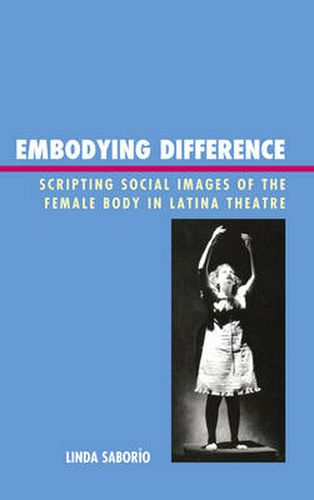Readings Newsletter
Become a Readings Member to make your shopping experience even easier.
Sign in or sign up for free!
You’re not far away from qualifying for FREE standard shipping within Australia
You’ve qualified for FREE standard shipping within Australia
The cart is loading…






Embodying Difference: Scripting Social Images of the Female Body in Latina Theatre explores contemporary theatrical productions by Latina dramatists in the United States and focuses on the effects that neoliberal politics, global market strategies, gender formation, and racial and ethnic marginalization have had on Latinas. Through the analysis of select plays by dramatists Nao Bustamante, Coco Fusco, Anne Garcia-Romero, Josefina Lopez, Cherrie Moraga, Linda Nieves-Powell, Dolores Prida, and Milcha Sanchez-Scott, Embodying Difference shows how the bodies of Latinas are represented on stage in order to create an image of Latina consolidation. The performances of a dynamic female body challenge assumptions about ethno-racial expressions, exoticized otherness, and political correctness as this book explores often uneasy sites of representations of the body including phenotype, sexuality, obesity, and the body as a political marker. Drawing on the theoretical framework of difference, including differing gender voices, performances, and performative acts, Embodying Difference examines social images of the Latina body as a means of understanding and rearticulating Latina subjectivity through an expression of difference. By means of a gradual realization and self-acclamation of their own images, Latinas can learn to embody notions of self that endorse their curvaceous, sexualized, and oversized bodies that have historically been marked and marketed by their brownness.
$9.00 standard shipping within Australia
FREE standard shipping within Australia for orders over $100.00
Express & International shipping calculated at checkout
Embodying Difference: Scripting Social Images of the Female Body in Latina Theatre explores contemporary theatrical productions by Latina dramatists in the United States and focuses on the effects that neoliberal politics, global market strategies, gender formation, and racial and ethnic marginalization have had on Latinas. Through the analysis of select plays by dramatists Nao Bustamante, Coco Fusco, Anne Garcia-Romero, Josefina Lopez, Cherrie Moraga, Linda Nieves-Powell, Dolores Prida, and Milcha Sanchez-Scott, Embodying Difference shows how the bodies of Latinas are represented on stage in order to create an image of Latina consolidation. The performances of a dynamic female body challenge assumptions about ethno-racial expressions, exoticized otherness, and political correctness as this book explores often uneasy sites of representations of the body including phenotype, sexuality, obesity, and the body as a political marker. Drawing on the theoretical framework of difference, including differing gender voices, performances, and performative acts, Embodying Difference examines social images of the Latina body as a means of understanding and rearticulating Latina subjectivity through an expression of difference. By means of a gradual realization and self-acclamation of their own images, Latinas can learn to embody notions of self that endorse their curvaceous, sexualized, and oversized bodies that have historically been marked and marketed by their brownness.